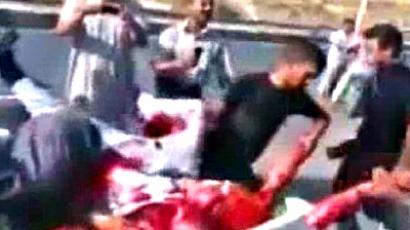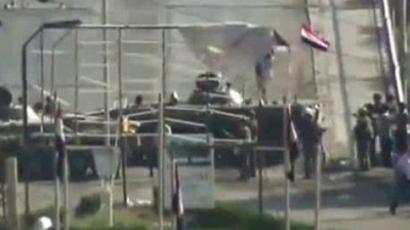Syria’s Assad calls a halt to military crackdown
On Wednesday, Syrian President Bashar Assad confirmed to the UN Secretary General, Ban Ki-moon, that police and army operations against anti-government protesters in the country are over.
The announcement came during a telephone conversation, and followed a demand by the UN chief for an immediate end to violence in the country. President Bashar Assad also agreed to allow a UN mission into Syria to assess the humanitarian situation, particularly in the cities of Hama and Lattakia which were stormed by Syrian troops carrying out a counter-militant operation.Syrian human rights organizations say more than 2,000 have been killed since unrest began to sweep the country in March. Since then, the US has made repeated demands for Syrian President Bashar Assad to leave power.It is thought the UN High Commissioner for Human Rights, Navi Pillay, might push for Syria’s rulers to face the International Criminal Court for their lethal crackdown on protesters.However, reports of soldiers being welcomed into Syrian cities appear to show that their presence is not always viewed negatively by local citizens. The city of Deir ez-Zor suffered a brutal militant occupation that lasted several days and serves as an example of the Syrian army being seen as a liberating rather than an oppressing force. “These bandits blocked the roads, put up barricades – it became a ghost city. We were hiding at home, we were just like hostages,” recalls local resident Hiba Deir Ezzor.The army says is spent more than a week fighting armed groups which had taken control of the city and were terrorizing its residents.Soldiers of the Syrian army are now leaving the city of Deir Ez-Zor near the Iraqi border. Military officials say the operation there is now over – the city has been freed from armed insurgents. People have been giving the soldiers a heroes’ welcome. But in other parts of the country, troops leading Assad's vicious crackdown are far from welcome. In a similar offensive against so-called terrorists in the coastal city of Lattakia, the opposition claims government troops killed almost 40. Human rights organizations say Assad is using his army to silence peaceful demonstrators across the country. “The Syrian army hasn’t met any resistance in the cities across the country where it entered,” insists Al Jazeera University Dean and political analyst Dr Hussein Amach. “Maybe there were some so-called bandits among protestors, and may be they used the momentum to spread chaos. But if so – where have they been when the army appeared? Armed groups is just a theory invented by the state to have an excuse to enter the cities.”In newly-liberated Deir Ez-Zor, life seems to be getting back to normal – the market has reopened and roads which were empty just a few days ago are again filled with cars. But evidence of the recent troubles is not too hard to find in the pockmarked walls. And the most obvious reminder is fear amongst the people of the city.Most of the local residents refuses to talk or be captured on camera, for fear of being thrown into jail.Assad’s opponents say intimidation is the real objective of his military operation and if that is the case – it seems to have worked.














